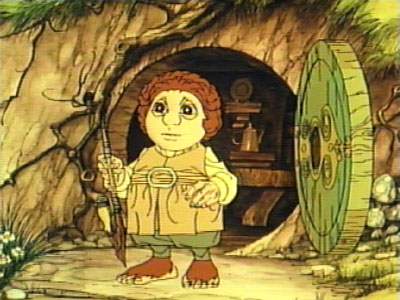 As I mentioned in a previous post, I have been reading the Hobbit in Hebrew. Thanks to David M. and Noa for lending us their copy. It is great reading. I probably haven't read it since I was twelve and am thoroughly enjoying it. I am reading it once to myself and more slowly Benjy and I are reading it together translating into English. There are occasional passages which I don't get and certainly words in most sentences which are hard but can be gleaned from context. It works well in Hebrew since it gives so much of the story that ancient once-upon-a-time feel that Tolkein worked so hard to give the book, when they get to the Dark Wood they are plunged into a choshech-Mitsrayim, "Egyptian darkness". I am using the translation by Moshe haNami which is vocalized which makes the reading so much easier. Vowels in Hebrew are written as dots and lines under the letters (though I recently learned that there were other systems which had voewels over the letters). Like Arabic, Hebrew is often written without the vowel marks -whch cn mk rdng prtt hrd. But kids books are often vocalized. If it wasn't for that I might have gotten the translation which was done by a group of Israeli POWs in an Egyptian prison. They worked on their English and one of the projects they did to keep themselves from going stir crazy (they were in from, I think, '67 until 1973; they said they were the only Israelis who were happy to see that war had broken out in 73 because it meant they had a chance of getting exchanged). They got a copy of the Hobbit in a Red Cross package and worked in teams to translate it and apparently produced a really good translation (though un-vocalized).
As I mentioned in a previous post, I have been reading the Hobbit in Hebrew. Thanks to David M. and Noa for lending us their copy. It is great reading. I probably haven't read it since I was twelve and am thoroughly enjoying it. I am reading it once to myself and more slowly Benjy and I are reading it together translating into English. There are occasional passages which I don't get and certainly words in most sentences which are hard but can be gleaned from context. It works well in Hebrew since it gives so much of the story that ancient once-upon-a-time feel that Tolkein worked so hard to give the book, when they get to the Dark Wood they are plunged into a choshech-Mitsrayim, "Egyptian darkness". I am using the translation by Moshe haNami which is vocalized which makes the reading so much easier. Vowels in Hebrew are written as dots and lines under the letters (though I recently learned that there were other systems which had voewels over the letters). Like Arabic, Hebrew is often written without the vowel marks -whch cn mk rdng prtt hrd. But kids books are often vocalized. If it wasn't for that I might have gotten the translation which was done by a group of Israeli POWs in an Egyptian prison. They worked on their English and one of the projects they did to keep themselves from going stir crazy (they were in from, I think, '67 until 1973; they said they were the only Israelis who were happy to see that war had broken out in 73 because it meant they had a chance of getting exchanged). They got a copy of the Hobbit in a Red Cross package and worked in teams to translate it and apparently produced a really good translation (though un-vocalized).I had forgotten a lot of the book and occasionally I wonder if the translator just dropped in his own random bits and pieces. The whole thing with Beorn the bear-man, don't remember that at all. At this time of year The Hobbit has special resonance beyond the plague of darkness, since the dwarves are on a sort of journey of historical recuperation, to undo their exile as it were. Tolkien, in his letters, wrote about his dwarves being similar to Jews "I do think of the 'Dwarves' like Jews: at once native and alien in their habitations, speaking the languages of the country, but with an accent due to their own private tongue.....". Of course the little, tribalistic, bearded dwarves are on that long journey back to their home-land because they want their gold back and some people accused him of being anti-Semitic. But he wrote a pretty sharp letter to a German company who wanted to make sure he wasn't Jewish before they published their translation of the Hobbit.
Bilbo strikes me this time around as a sort of Bertie Wooster figure, very proper and British, with a loathing of anything too out of the ordinary, very attached to his material comforts, nearly paralyzed at having left the house without his hat. The amount of time spent describing food in the book is certainly reminiscent of Wodehouse. Gandolf is Bilbo's Jeeves, pulling him out of tight spots at the last moment, never setting a foot wrong. It's sort of like Wooster and Jeeves accidentally ending up on trip to Israel with a dozen Belzer Hasidim where everything goes wrong, the wheels fall off the bus and the luggage all gets eaten by Orcs.
Maybe when I finish reading it, I will work on a translation into English so that non-Hebrew readers can finally enjoy this wonderful piece of literature.




1 comment:
Dude, I read the Hobbit to the kids over Christmas holidays and we all had a great time. I had forgotten how well paced a story it is for reading aloud - always a bit of description and then a little crisis... glad you guys are having fun with it.
Post a Comment